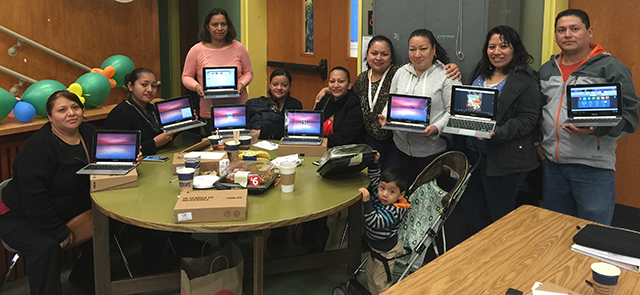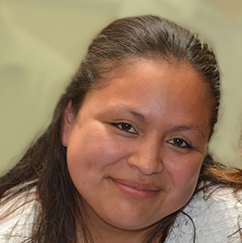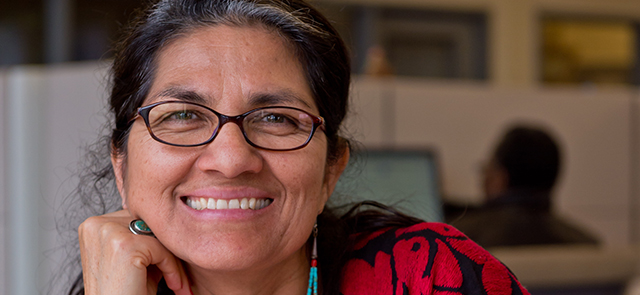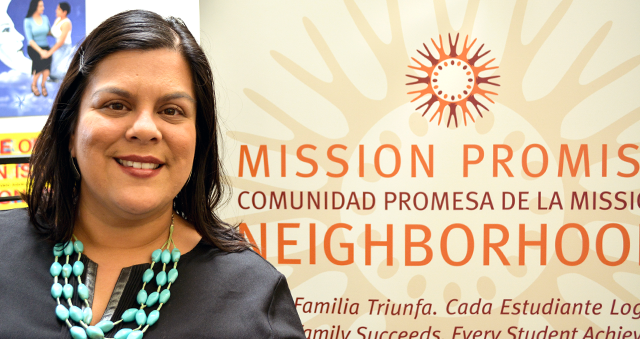[Click for English, which follows Spanish.]
A la Comunidad Promesa de la Mission la conocí por medio de mi sobrino que estaba en un programa de Seven Tepees Youth Program, uno de los socios fundadores de la Comunidad Promesa. Era el año 2014, hubo una feria de recursos en la que personal de MEDA estaba entregando información sobre compra de vivienda y el concilio de familias. Me interesó porque en ese tiempo quería información sobre cómo comprar una casa. Hice una cita con ellos y ahí empezó todo.
La primera persona con la trabaje en Comunidad Promesa fue con Ada Alvarado Freund, que hoy es la gerente del programa de Aprendizaje infantil. Tenía mis dos hijos pequeños y estaba buscando un programa preescolar de alta calidad. Le pedí que me ayudara a encontrar una escuelita. La verdad no conocía mucho sobre Comunidad Promesa o sobre los recursos que hay disponibles para las familias antes de esos primeros contactos con Ada y el resto de personas que trabajan en MEDA. Mi mamá trabajaba mucho cuando recién llegamos a Estados Unidos, descansaba unas cuatro horas, y no le quedaba mucho tiempo para involucrarse con la comunidad. Luego se sorprendía cuando yo le mencionaba sobre los recursos que había. Algunas vez tuvimos el apoyo de Good Samaritan, pero desconocíamos que era una organización parte de Comunidad Promesa. Es un alivio saber que alguien te puede ayudar sin tener miedo que te juzgue por necesitar un poco de apoyo para salir adelante y dar lo mejor a tu familia.
Mi segunda gran conexión con MEDA fue a través del programa de Mission Techies. En ese tiempo trabajaba limpiando casa, que es un trabajo digno, pero también tenía otras metas. Era consciente de mis privilegios por ser bilingüe, tener un estatus migratorio regularizado, y saber operar una computadora. Debía tomar el programa porque iba a cumplir 25 años y en ese entonces sólo se aceptaban a personas entre 16 y 24 años. Mi madre y mi esposo me apoyaron bastante. Ellos iban por los niños a la escuela. Trabajaba limpiando casas de ocho a doce y media, para luego venir a Techies de una a cinco de la tarde. Fueron semanas largas, de mucho esfuerzo.
Recibí asistencia de MEDA en la búsqueda de empleo y la primera oportunidad que apareció fue como contratista Comunidad Promesa para el programa Making Connections del Distrito Escolar de San Francisco. Aquí se enseñaba a padres o tutores de estudiantes a usar una computadora Chromebook. En un momento tuve la oportunidad de ayudar a cambiar el currículo para que fuera culturalmente relevante para nuestras familias. También me enfoqué en que tuvieran acceso a internet de bajo costo. Más adelante los conecté con el servicio de preparación gratis de impuestos de MEDA y así empecé a trabajar con las familias. Un año después me contrataron de tiempo completo, dividía mis labores entre Making Connections y Guía de éxito familiar. Estuve asignada a Bryant Elementary, luego a John O’Connell y después a Felton Institute. De ahí pasé a ser Especialista en participación de padres y jóvenes con la organización.
Ahora estoy en Promise City* con la meta de siempre: apoyar a las familias para que tengan una voz y un espacio donde digan lo que les está sirviendo y lo que no, lo que les está ayudando y lo que no. Siento que puedo llevar su voz a espacios en los que regularmente no son invitados.
He pasado junto a la Comunidad Promesa ocho de sus diez años. Le he dicho a mis supervisores que más allá de que hoy tenga ingresos y vivienda estable (sí, compre una casa), la Comunidad Promesa me ha ayudado a crecer en lo profesional, emocional y personal. Gracias a todos los entrenamientos que me han dado he aprendido a conectar con las familias, entre ellas la mía. Tengo un hijo transgénero que no quiero que crezca en la sombras por ser transgenero, quiero que vea la misma luz de los demás, que no sea tratado diferente. He aprendido a entender a mi hijo y no juzgarlo. Dejo que él me guíe en su vida y que él decida cómo quiere vivir su vida en el futuro.
Soy una madre que se involucra en el Comité asesor de padres ( English Learner Advisory Committee) de las escuelas. Con mi hija me he involucrado desde el principio. He hablado en foros públicos sobre la importancia de la interpretación. Por mi hijo fundé un pride club, en donde los niños aprenden sobre la comunidad LGTBQ. Quiero que mis hijos sepan que estoy allí por ellos, para ellos y con ellos.
La Comunidad Promesa ha sido más que un trabajo para mí.
Ahora visualizó a la Comunidad Promesa abriendo el camino para otras comunidades en la ciudad. Las necesidades de los latinos no son tan diferentes a las necesidades de nuestros vecinos asiáticos o afroamericanos. Las familias merecen tener vivienda estable y segura para ellos y sus hijos. Me gusta el abordaje de la Comunidad Promesa porque se enfoca en el bienestar de todos, no solo una persona, por eso es importante el rol de cada socio de la Comunidad Promesa. Sabemos que se requiere de todo un pueblo para criar a un niño.
*Promise City es una iniciativa para compartir el modelo Promise Neighborhood en todo San Francisco en consonancia con el Plan de Recuperación de la Alcaldía
Ana Avilez: My Journey Through Mission Promise Neighborhood
I first learned about Mission Promise Neighborhood (MPN) through my nephew who was in a program with Seven Tepees Youth, one of the founding partners of MPN. It was the year 2014, and there was a community fair where MEDA staff were handing out information on home buying and the family council. It interested me, because at that time, I wanted information on how to buy a house. I made an appointment with them, and that’s where it all started.
The first person I worked with at Comunidad Promesa was Ada Alvarado Freund, who is now the manager of the Early Childhood Learning program. I was looking for a high-quality preschool for my two young children. I asked Ada to help me find an escuelita. I didn’t know much about MPN or about the resources that are available to families – before those first contacts with Ada and other MEDA staff. My mom worked a lot when we first arrived in the United States, she was resting for about four hours daily, and she didn’t have much time left to get involved in the community. Later she was surprised when I mentioned to her about the resources that were available. I believe we had some support by Good Samaritan, but we were unaware that it was an organization that was part of MPN. It is a relief to know that someone can help you without being afraid that they will judge you for needing a little support to get ahead and give the best to your family.
My second big connection with MEDA was through the Mission Techies program. At that time I was working cleaning houses, which is a decent job, but I also had other goals. I was aware of my privileges for being bilingual, having regular immigration status, and knowing how to operate a computer. I had to take the program because I was going to turn 25, and at that time only people between the ages of 16 and 24 were accepted. My mother and my husband were very supportive of me. They went to pick up the children from school. I worked cleaning houses from eight to twelve thirty, and then came to Techies from one to five in the afternoon. Those were long weeks, a lot of effort.
I received job search assistance from MEDA and the first opportunity that came up was as a contractor for MPN for the Making Connections program that was funded by the San Francisco Unified School District. Here parents or guardians were taught how to use a Chromebook computer. At some point, I had the opportunity to change the curriculum to make it culturally relevant to our families. I also focused on helping families obtain low-cost internet access. Later I connected them with MEDA’s free tax preparation service, and in a blink of an eye I was connecting families with resources. A year later I was hired full time by MEDA-MPN as a Family Success Coach, dividing my duties between Making Connections and as Family Success Coach. I was assigned to Bryant Elementary, then to John O’Connell High School, and later to Felton Institute. Later I became MPN’s Parent and Youth Engagement Specialist and was based at Plaza Adelante.
Now I work for Promise City* with the same goal: supporting families so that they have a voice and a space where they say what is working for them and what is not, what is helping them and what is not. I feel like I can bring their voices to spaces where they are not regularly invited.
I have been with MPN for eight of their ten years. First as a client and later as a team member. I have told my supervisors that beyond the fact that today I have a steady income and stable housing (yes, I bought a house), MPN has helped me grow professionally, emotionally, and personally. Thanks to all the training they have given me, I have learned to connect with families, including mine. I have a transgender son, and I don’t want him to grow up in the shadows because he is transgender. I want him to see the same light as others, not to be treated differently. I have learned to understand my son and not judge him. I let him guide me through his life and let him decide how he wants to live his life in the future.
I’m a parent who gets involved in the schools’ English Learner Advisory Committee. With my daughter I have been involved from the beginning. I have spoken in public forums about the importance of interpretation. I also started a pride club at my son’s school, where children can learn about the LGTBQ community. I want my children to know that I am there for them and with them.
MPN has been more than a job for me.
Now I envision MPN leading the way for other communities in the city. The needs of Latinos are not that different from the needs of our Asian or African American neighbors. Families deserve stable and safe housing for themselves and their children. I like the MPN approach because it focuses on the well-being of everyone, not just one person, which is why the role of each partner organization is so instrumental. We know it takes a village to raise a child.
*Promise City is a citywide initiative to share the Promise Neighborhood model across San Francisco in alignment with the Mayor’s Recovery Plan.









